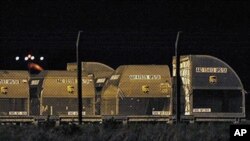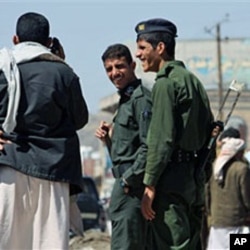U.S. and British counterterrorism officials say bombs hidden in aircraft cargo apparently originating in Yemen appear to have been designed to explode in flight. Some intelligence analysts believe that al-Qaida is targeting Western economic infrastructure, but others say it was just going after easier targets.
Anyone who has taken a flight since September 11, 2001 is familiar with the airport security drill of walking through a metal detector, perhaps followed by a more intrusive body pat-down or scan. But air cargo, whether flown in the hold of a passenger jet or on a commercial cargo aircraft operated by companies such as UPS, DHL or FedEx, rarely gets the same level of scrutiny.
So were the recently intercepted bombs in cargo because they would not be closely checked? Or is Al-Qaida on the Arabian Peninsula, the group widely assumed to have dispatched the bombs, embarked on a strategic shift away from mass casualty attacks toward strikes on economic infrastructure?
Analysts believe al-Qaida has always sought to strike targets not only to inflict mass casualties, but for symbolic reasons. Former FBI National Security Branch chief Philip Mudd says that is why al-Qaida came back to attack the World Trade Center a second time.
"It's not a stretch to suggest that these guys look at this, at this kind of attack in those strategic terms," said Mudd. "You go back further than 9/11, you look at the first World Trade Center attack in the early '90s. It's not just an attack on a vulnerable target; it's an attack on an iconic target that represents the capability of America to project power overseas - the American dollar."
Former Homeland Security intelligence chief Charles Allen says that in the terrorists' view, attacking cargo transit is a way to slow up the Western economic system by forcing nations to more closely scrutinize cargo.
"The Twin Towers was an iconic target. It was a symbol of American prowess and strength in the world," Allen said. "It also gave them the view that if they can strike blows and cripple American infrastructure, hitting American cargo, and as you know there are hundreds and thousands of flights daily, would have a very disturbing effect. And of course there's all kinds of UPS-type materials that fly in the holds of passenger airlines."
But other analysts disagree with that view. Glenn Carle, the former Deputy National Intelligence Officer for Transnational Threats, agrees that al-Qaida wants to hit iconic symbols. But he believes the cargo plane plot simply means al-Qaida is being forced to go after easier targets.
"They did have this doctrine, if you can call it that, of going after symbolic icons of American and Western power, prestige, and financial and economic strength in a way that would cause mass casualties. I think that they still will love to do that, and are probably attempting to," Carle said. "But I think they also are realists and will strike wherever they are able to do so. And so that means you have possibly a larger number of lower order, but still terrible, threats."
Carle dismisses al-Qaida leader Osama bin Laden's threats to cripple Western economic infrastructure as mere bragging.
"Now, going after an economic impact, I always found, frankly, bin Laden's comments about supposed conscious intention to strike at the heart of America's financial system with the 9/11 attack to be ex-post-facto and self-glorifying," he said.
Nevertheless, former intelligence and security officials say cargo will certainly get closer scrutiny. With the overwhelming amount of cargo shipped every day, it is not clear how that will be accomplished. But former Homeland Security Intelligence Chief Charles Allen says that will likely entail a form of cargo profiling, where parcels from some countries will undergo especially close inspection.
"There will be certain packages originating from certain countries under certain circumstances that will require far additional checking," said Allen.
After the latest bombs were discovered, the Department of Homeland Security issued a notice that the flying public may see some heightened security measures at airports, including additional cargo screening and security. Meanwhile, both FedEx and UPS announced a suspension of shipments from Yemen.
Related video report by Laurel Bowman:





